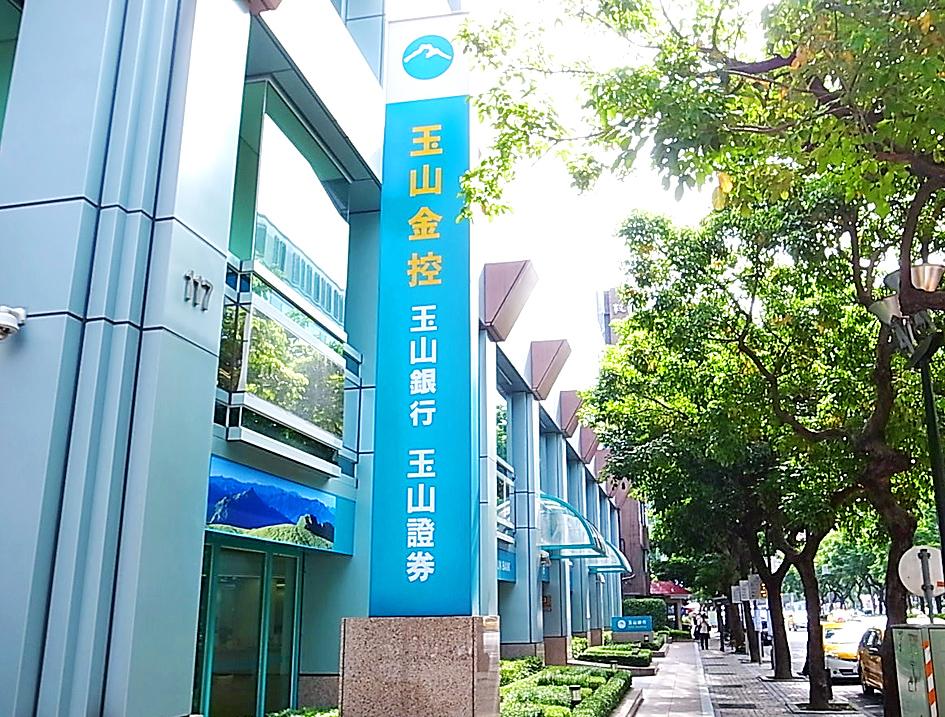E.Sun Financial Holding Co (玉山金控) on Monday reported net fee income of NT$5.27 billion (US$189.1 million) for the first quarter of this year, the highest quarterly figure in its history, thanks to contributions from E.Sun Securities Co (玉山證券) as more investors participated on the local stock market.
E.Sun Securities’ net fee income increased 52.5 percent year-on-year to NT$840 million in the first quarter, accounting for 16.3 percent of the holding company’s net fee income, E.Sun Financial said in a statement.
As of the end of last year, the securities unit’s fee income contributed 12.4 percent to its parent company’s total fee income.

Photo: Kelson Wang, Taipei Times
The growth in fee income boosted E.Sun Securities’ net profit by 274 percent from a year earlier to NT$416 million in the first quarter.
E.Sun Financial’s banking unit, E.Sun Commercial Bank (玉山銀行), reported that net fee income at its credit card business dropped 8 percent last quarter, but rose 3.8 percent at its wealth management operations.
The two divisions contributed to two-thirds of E.Sun Financial’s total net fee income, company data showed.
E.Sun Commercial’s net profit fell 12 percent year-on-year to NT$4.41 billion last quarter, with its net interest margin sliding to 1.2 percent, down 14 basis points from a year earlier, while its non-performing loan ratio remained flat at 0.19 percent.
The non-performing loan ratio for mortgages was 0.07 percent, down from 0.08 percent at the end of last year.
The bank’s loan balance rose 9 percent annually to NT$1.46 trillion, with mortgages expanding 19.7 percent, personal loans growing 12 percent and loans to small-and-medium enterprises rising 15 percent.
However, loans denominated in foreign currencies declined 6.7 percent.

Taiwan Semiconductor Manufacturing Co (TSMC, 台積電), the world’s biggest contract chipmaker, booked its first-ever profit from its Arizona subsidiary in the first half of this year, four years after operations began, a company financial statement showed. Wholly owned by TSMC, the Arizona unit contributed NT$4.52 billion (US$150.1 million) in net profit, compared with a loss of NT$4.34 billion a year earlier, the statement showed. The company attributed the turnaround to strong market demand and high factory utilization. The Arizona unit counts Apple Inc, Nvidia Corp and Advanced Micro Devices Inc among its major customers. The firm’s first fab in Arizona began high-volume production

VOTE OF CONFIDENCE: The Japanese company is adding Intel to an investment portfolio that includes artificial intelligence linchpins Nvidia Corp and TSMC Softbank Group Corp agreed to buy US$2 billion of Intel Corp stock, a surprise deal to shore up a struggling US name while boosting its own chip ambitions. The Japanese company, which is adding Intel to an investment portfolio that includes artificial intelligence (AI) linchpins Nvidia Corp and Taiwan Semiconductor Manufacturing Co (TSMC, 台積電), is to pay US$23 a share — a small discount to Intel’s last close. Shares of the US chipmaker, which would issue new stock to Softbank, surged more than 5 percent in after-hours trading. Softbank’s stock fell as much as 5.4 percent on Tuesday in Tokyo, its

The prices of gasoline and diesel at domestic fuel stations are to rise NT$0.1 and NT$0.4 per liter this week respectively, after international crude oil prices rose last week, CPC Corp, Taiwan (台灣中油) and Formosa Petrochemical Corp (台塑石化) announced yesterday. Effective today, gasoline prices at CPC and Formosa stations are to rise to NT$27.3, NT$28.8 and NT$30.8 per liter for 92, 95 and 98-octane unleaded gasoline respectively, the companies said in separate statements. The price of premium diesel is to rise to NT$26.2 per liter at CPC stations and NT$26 at Formosa pumps, they said. The announcements came after international crude oil prices

SETBACK: Apple’s India iPhone push has been disrupted after Foxconn recalled hundreds of Chinese engineers, amid Beijing’s attempts to curb tech transfers Apple Inc assembly partner Hon Hai Precision Industry Co (鴻海精密), also known internationally as Foxconn Technology Group (富士康科技集團), has recalled about 300 Chinese engineers from a factory in India, the latest setback for the iPhone maker’s push to rapidly expand in the country. The extraction of Chinese workers from the factory of Yuzhan Technology (India) Private Ltd, a Hon Hai component unit, in southern Tamil Nadu state, is the second such move in a few months. The company has started flying in Taiwanese engineers to replace staff leaving, people familiar with the matter said, asking not to be named, as the